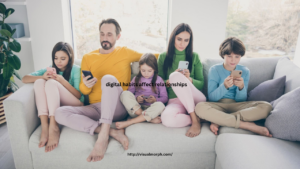 In today’s digital era, technology has transformed the way we interact, communicate, and build relationships. From instant messaging to video calls, our connections are often facilitated through screens. While these digital tools have made communication more convenient, they have also profoundly impacted the quality and depth of our relationships. The way we engage with technology can either strengthen or weaken our emotional bonds, making it crucial to understand how our digital habits shape our connections with others.
In today’s digital era, technology has transformed the way we interact, communicate, and build relationships. From instant messaging to video calls, our connections are often facilitated through screens. While these digital tools have made communication more convenient, they have also profoundly impacted the quality and depth of our relationships. The way we engage with technology can either strengthen or weaken our emotional bonds, making it crucial to understand how our digital habits shape our connections with others.
One of the most apparent ways digital habits affect relationships is by altering communication styles. With the rise of texting, social media interactions, and emails, face-to-face conversations have diminished. While written messages allow for quick and efficient exchanges, they often lack the emotional nuances of tone, facial expressions, and body language. This can lead to misinterpretations, misunderstandings, and a decline in deep, meaningful conversations. Over time, the absence of in-person interactions may weaken emotional intimacy and create a sense of disconnection between individuals.
Social media plays a significant role in shaping modern relationships, influencing how people perceive themselves and others. While these platforms provide a means to stay in touch, they can also create unrealistic expectations about relationships. Many individuals compare their own experiences to the carefully curated and often idealized portrayals of love, friendships, and lifestyles they see online. This constant exposure to seemingly perfect relationships can foster feelings of inadequacy, insecurity, and dissatisfaction, ultimately straining real-life connections.
Another way digital habits influence relationships is through the impact of screen time on quality interactions. With smartphones, tablets, and other devices always within reach, it is easy to become distracted during conversations and shared moments. The phenomenon known as “phubbing”—the act of ignoring someone in favor of a phone—has become increasingly common, leading to feelings of neglect and frustration in relationships. When digital distractions take precedence over personal interactions, the emotional bond between individuals may weaken.
However, technology is not inherently harmful to relationships. When used mindfully, digital tools can enhance connections and bridge long-distance relationships. Video calls, messaging apps, and social media allow people to maintain close relationships despite physical distance. Additionally, technology enables individuals to express emotions and thoughts in ways that may be difficult in face-to-face interactions. For instance, some people find it easier to open up about their feelings through texts or emails rather than in-person conversations.
To foster healthier relationships in a digital world, it is essential to practice mindful technology use. Setting boundaries around screen time, prioritizing in-person interactions, and engaging in meaningful conversations can help maintain strong emotional connections. Couples and friends can benefit from “tech-free” times, where they put away their devices and focus entirely on each other. Furthermore, being mindful of how social media influences self-perception and relationship expectations can help individuals cultivate more authentic and fulfilling connections.
Ultimately, our digital habits shape the way we connect with others, for better or worse. By using technology intentionally and balancing online interactions with real-world experiences, we can nurture meaningful relationships that extend beyond screens and touch the depths of our souls.